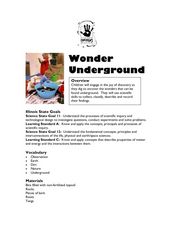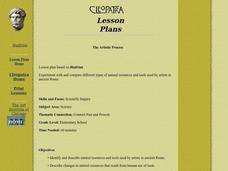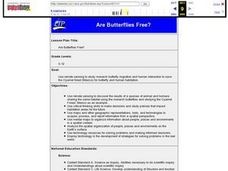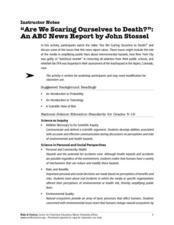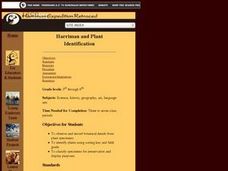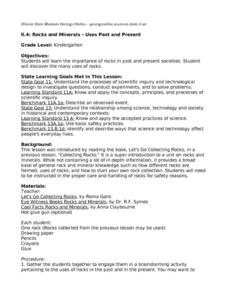Curated OER
Steps To An Inquiry Process
Fourth graders investigate the research process. The finding of information about the indian tribes of Montana provides the context for student practice. They identify the problem and generate questions to find answers. The main...
University of Minnesota
Dendritic Spines Lab
This is your brain on drugs ... literally! Your neuroscientists-in-training examine the evidence of drug use on the human brain and how neurons change their connectivity when altered by drugs. They then work together to create testing...
Curated OER
Dirty Decomposers
Students explore the ecosystem by conducting a ziploc bag experiment. In this recycling lesson, students identify decomposer organisms in our environment and how they speed up the recycling process. Students utilize a ziploc plastic bag,...
PBS
Predicting/Making a Hypothesis
As an introduction to the hypothesis and testing method of investigation, young history detectives engage in a special investigation of a family artifact. After watching a short video that demonstrates the method, they develop a...
American Institute of Architects
Architecture: It's Elementary!—Fifth Grade
Young citizens construct an understanding of urban planning in this cross-curricular unit. Covering every aspect of city development from the political, economic, and social influences to sustainable building practices, this...
Orange County Water Atlas
Location, Location, Location…
Young geographers discover not only how to read and recognize coordinates on a map, but also gain a deeper understanding of latitude and longitude and how climate changes can vary significantly across latitudes.
Curated OER
Wonder Underground
Students classify and record objects they find "underground." In this observation instructional activity, students dig into bins filled with soil and encounter various objects such as bark, twigs, etc. Students classify their findings.
Curated OER
The Artistic Process
Students experiment with and compare different types of natural resources and tools used by artists in ancient Rome. They describe changes in natural resources that result from human use of tools.
Curated OER
Are Butterflies Free?
Students use remote sensing to study monarch butterfly migration and human interaction to save the Oyamel forest (Mexico) for butterfly and human habitation.
American Psychological Association
Resource Vetting Rubric
How do you assure that the resources you find for your classes are of good quality? Check out a vetting rubric that suggests eight questions to ask when considering lesson plans, activities, demonstrations, and pictures for classroom use.
Curated OER
Earth, The Universe, And Culture
Learners examine how science is interpreted based on social environments. They watch and discuss a video, identify scientists and locate their countries of origin on a map, explore various websites, and complete a handout.
American Psychological Association
Using Psychological Perspectives to Answer Questions on Behavior
Perspective is everything when it comes to assessing human behavior. Class members examine a series of statements and identify the perspective represented by each to demonstrate their understanding of different psychological perspectives.
Curated OER
Are We Scaring Ourselves to Death?
Interesting! Have your high schoolers watch this 13-minute clip from the documentay, "Are We Scaring Ourselves to Death?" It examines the fear we have as a culture about death and whether or not the media increases those fears. The focus...
Curated OER
Science Current Events
Seventh graders write science current events articles using various media sources.
Curated OER
The New Organon
In this online interactive history instructional activity, students respond to 10 short answer and essay questions about Francis Bacon's The New Organon. Students may check some of their answers on the interactive...
Curated OER
Gathering, Traditions, and Nutrition of Our Food
Students gain a better understanding of what it means to eat seasonally through learning about traditional hunting, gathering, and food preparation methods of Athabascan tribes. By interacting with Native American Elders and...
Curated OER
Net Results
Students investigate through role play how decisions by watermen, recreational fisherpeople, and lawmakers influence and are influenced by economics and the abundance or scarcity of fish and shellfish stocks. They consider social,...
Curated OER
Rain Forest Adventures
Learners discover locations of the world's rain forests. Once they identify the animals, plants, products, and resources located in them, they construct they own rain forest terrariums. By comparing and contrasting the two types of...
Curated OER
Harriman and Plant Identification
Students observe and record botanical details from the plant specimens. They identify plants using sorting key and field guide and classify specimens for preservation and display purposes.
Curated OER
New Hampshire Unplugged
Young historians explore how technology and science affected life in the state of New Hampshire. They define technology and give personal experiences of how technology affects people and how people have used technology. They compare the...
Curated OER
Where In the World Are the Resources?
Students use the internet to research the amount of natural resources in a specific area on Earth. In groups, they locate the supply of each natural resource on a map in that area and what can be done to reduce their usage. They also...
Curated OER
Conveyor Belt Production
Students design a system that will move their glass product across a room in the plant. They must move the product 12 feet and their items cannot fall off at any time.
Curated OER
Rocks and Minerals- Uses Past and Present
Students investigate the use of rocks in past and present societies. They examine how important rocks are.
Curated OER
The Fault Line
Students use cardboard models of the North American and Pacific plates and sand to investigate what happens when there is an earthquake or movement along the boundaries of the plates.






